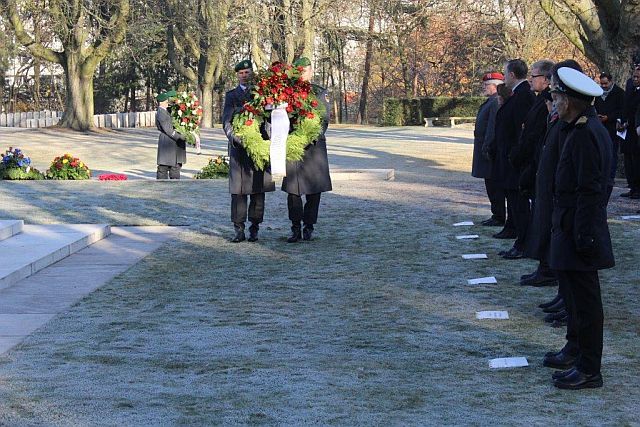

 The South African
The South African
The Commonwealth Remembrance Day is an important date in the event calendar of Berlin, Germany. Each year, an embassy of a Commonwealth country that is represented by a Defence Attache Office (DAO), organises the Remembrance Act at the 1939-1945 War Cemetery in Berlin. This cemetery is the last resting place for some 3 594 servicemen who gave their lives in the cause of freedom between 1939 and 1945, 31 of them being South Africans. This year, on 13 November 2016, the Embassy of the Republic of South Africa in Berlin had the honour of organising and hosting this important event.
Remembering and honouring those who served and who have lost their lives in the line of duty has a long tradition in South Africa. These acts of remembrance are taken very seriously and are as important for our men and women in uniform as they are for the South African people in general. The South African DAO Berlin thus took great pleasure in organising the Commonwealth Act of Remembrance outside South African borders to remember those who gave their lives. The importance of this event for the South African National Defence Force (SANDF) and the South African Embassy was heightened by the approaching centenary of the loss of South African lives in the sinking of the SS Mendi in the First World War, to be commemorated by the sailors of her modern namesake, the SAS MENDI in February 2017. These men were remembered along with the fallen from all nations during not only the First World War but all the conflicts that took place.

The service was opened by the Reverend Canon Jage-Bowler with the bidding. The Exhortation was read by the Ambassador of New Zealand. The Ambassador of the United Kingdom was invited to read the Kohima Epitaph. The South African Minister Plenipotentiary, Mr Horst H Brammer, and the South African Defence Attache, Captain (SAN) Nigel J Fillis, laid the wreath on behalf all Commonwealth countries. Others were laid by the mayor, the Bundeswehr, military associations, veterans' associations as well as schools. The sheer number of wreaths that were laid at the Stone of Remembrance shows the importance of these Remembrance Acts - perhaps more so today than ever. Those who gave their lives shall not and must not be forgotten. This was also stressed by Minister Plenipotentiary Brammer, who delivered the keynote address in which he emphasised the importance of diplomatic efforts to avoid war. He furthermore acknowledged not only the soldiers who fell during the World Wars but also the men and women who died during liberation struggles.
The Remembrance Act was attended not only by Commonwealth countries, but by virtually all defence attachés, and members of the diplomatic corps, the German armed forces, the German government, and military associations, as well as veterans and the German public. The event was concluded by a church service at St George's Anglican Church.
Looking back at a very successful and dignified Remembrance Act, we would like to thank all those who rendered their support and contributed to the success of the event, including the German armed forces, the Berlin Police, the Black Kilts, the Royal British Legion, and the Commonwealth War Graves Commission. We take great pride in the fact that we were granted the opportunity to honour those who gave their lives during war, conflicts and the struggle for liberation. We will remember them.
Return to Journal Index OR Society's Home page
South African Military History Society / scribe@samilitaryhistory.org